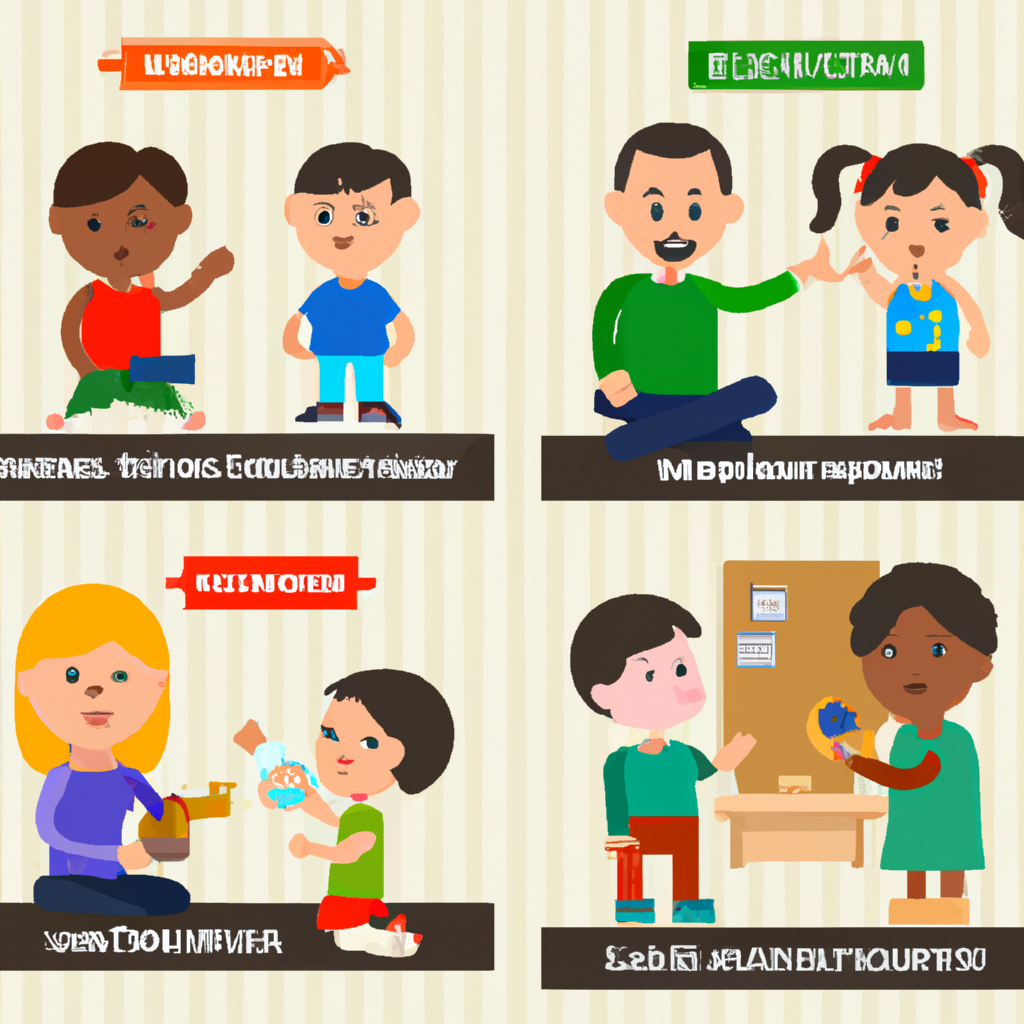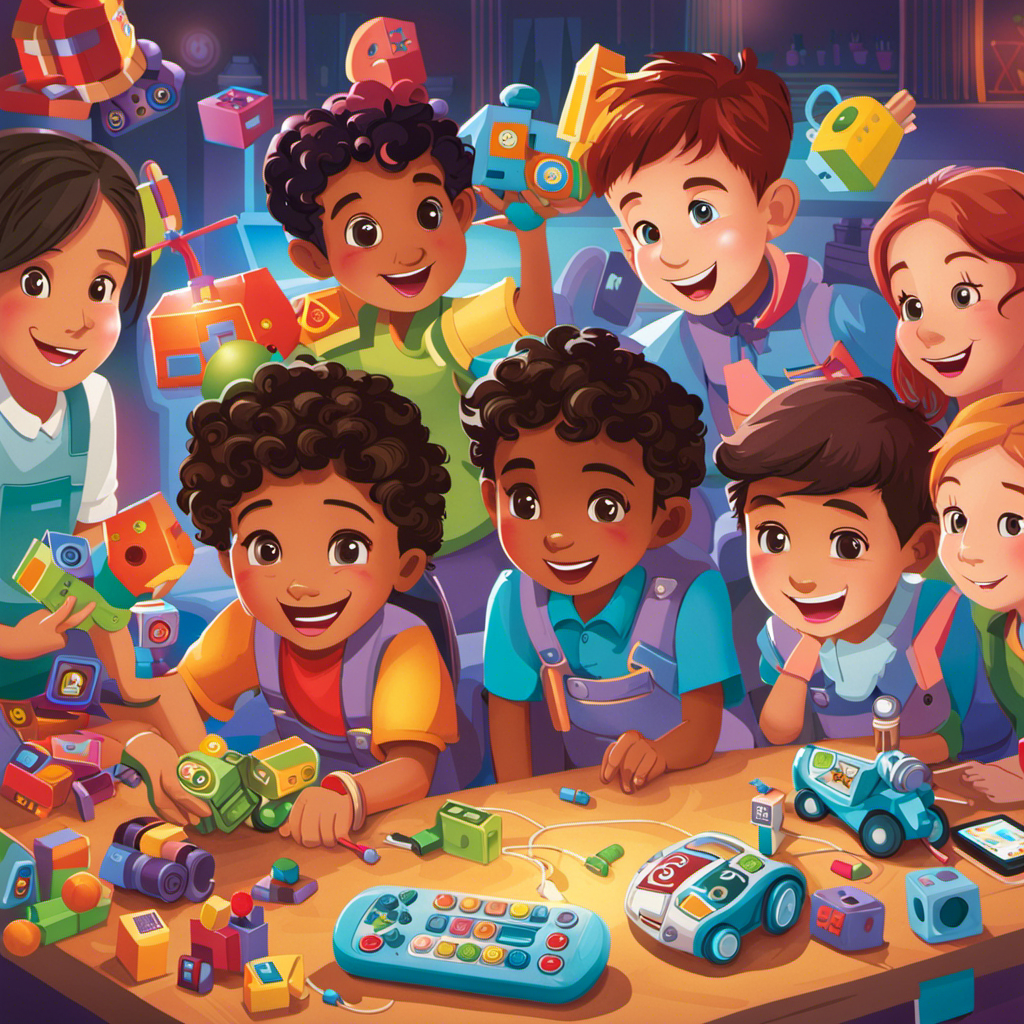You may be asking yourself, “Is pretend play really important for a child’s development?” Let me assure you, without a doubt, it is.
Pretend play, also known as imaginative play, is a crucial aspect of a child’s growth and learning. Through engaging in make-believe scenarios, children develop essential social, cognitive, emotional, and language skills.
Furthermore, pretend play enhances problem-solving abilities and fosters creativity. In this article, we will delve into the various ways in which pretend play positively impacts a child’s overall development.
Key Takeaways
- Pretend play enhances cognitive skills such as critical thinking, problem-solving, and decision-making.
- Pretend play supports the development of empathy and social skills through role-playing scenarios.
- Pretend play promotes language development by expanding vocabulary, enhancing syntax and grammar, and improving overall language fluency and proficiency.
- Parental involvement in facilitating pretend play benefits the child’s development by enhancing the learning experience, providing guidance and support, and strengthening the parent-child relationship.
The Importance of Pretend Play in Child Development
Pretend play is crucial for a child’s development. Research has shown that there are numerous benefits of pretend play in child development, particularly in the area of cognitive development. When children engage in pretend play, they are able to use their imagination and creativity to create new scenarios and problem-solve. This type of play helps to enhance their cognitive skills such as critical thinking, problem-solving, and decision-making.
During pretend play, children often take on different roles and act out various scenarios. This not only allows them to explore different perspectives and emotions but also helps to develop their understanding of cause and effect relationships. For example, when pretending to be a doctor, they learn that taking care of patients and administering medicine can help make them feel better.
Furthermore, pretend play also aids in the development of executive functions, such as planning, organizing, and self-control. Children engage in complex thinking and planning when creating and organizing their imaginary worlds. They have to remember the rules of the pretend scenario, keep track of multiple roles and responsibilities, and control their own actions and behaviors.
In conclusion, pretend play plays a significant role in cognitive development. It provides children with the opportunity to explore their imagination, enhance their problem-solving skills, and develop their executive functions.
Now, let’s transition to the subsequent section about how pretend play helps develop social skills.
How Pretend Play Helps Develop Social Skills
Engaging in imaginative activities supports the development of important social skills in young children. Pretend play provides a platform for children to practice and develop their social skills in a safe and controlled environment. Through pretend play, children learn to take on different roles and perspectives, which helps in developing empathy. When children pretend to be someone else, they are able to understand and relate to the feelings and experiences of others. This ability to understand and share the emotions of others is a crucial aspect of empathy.
Furthermore, pretend play promotes cooperation among children. As they engage in imaginative activities together, they learn to negotiate, take turns, and work towards a common goal. Pretend play often involves role-playing scenarios, such as playing house or setting up a pretend store, where children have to work together and take on different roles to make the play scenario successful. This encourages cooperation and collaboration, skills that are essential for successful social interactions.
In addition to developing empathy and promoting cooperation, pretend play also offers numerous cognitive benefits for child development. By engaging in imaginative activities, children enhance their creativity, problem-solving skills, and language development. These cognitive benefits will be explored further in the subsequent section about the cognitive benefits of pretend play in child development.
Cognitive Benefits of Pretend Play in Child Development
When it comes to the cognitive benefits of pretend play in child development, there are several key points to consider.
First, pretend play enhances problem-solving skills by allowing children to explore different scenarios and come up with creative solutions.
Second, pretend play fosters creativity and imagination by encouraging children to think outside the box and use their imagination to create new worlds and stories.
Lastly, research has shown that pretend play is essential for cognitive development as it helps children develop important cognitive skills such as memory, attention, and language.
Overall, pretend play has a profound impact on a child’s cognitive development and should be encouraged and nurtured.
Enhancing Problem-Solving Skills
To enhance your problem-solving skills, try incorporating pretend play into your daily activities. Pretend play not only provides entertainment but also offers numerous cognitive benefits. Here are four ways in which pretend play can enhance critical thinking skills and promote decision-making abilities:
-
Encourages imaginative problem-solving: Pretend play allows you to create scenarios and solve problems within the context of your imagination, fostering creative thinking and problem-solving skills.
-
Promotes flexibility and adaptability: Pretend play often involves unexpected twists and turns, requiring you to think on your feet and adapt your strategies accordingly.
-
Enhances abstract thinking: Pretend play often involves creating imaginary worlds and scenarios, which require you to think abstractly and consider multiple possibilities.
-
Develops planning and decision-making skills: Pretend play requires you to make decisions about your character, actions, and goals, honing your ability to strategize and make informed choices.
Fostering Creativity and Imagination
By incorporating imaginative activities into your daily routine, you can foster creativity and imagination. These activities not only provide entertainment but also play a crucial role in child development.
Fostering creativity and imagination in children is essential for their overall growth and well-being. It helps them explore new ideas, think outside the box, and problem-solve in innovative ways.
Moreover, imaginative play also promotes self-expression and social interaction. Children learn to communicate their thoughts, feelings, and ideas through pretend play, allowing them to develop important social skills and build relationships with others.
Through role-playing and storytelling, they learn about empathy, cooperation, and conflict resolution. Pretend play is not just about fun; it is a powerful tool for emotional and cognitive development in children.
Pretend Play and Emotional Development in Children
Pretend play can help children develop their emotional skills. Research has shown that engaging in pretend play allows children to practice emotional regulation. By pretending to be different characters and experiencing various emotions, children learn to identify and manage their own emotions effectively. Pretend play also provides an opportunity for children to develop empathy. Through pretending to be someone else, children can step into another person’s shoes and understand their emotions and perspectives. This helps them develop a sense of empathy and compassion towards others.
During pretend play, children engage in imaginative scenarios that often involve conflict and problem-solving. This allows them to explore different emotions and learn how to navigate through challenging situations. They can experiment with different emotional responses and learn the consequences of their actions. Through these experiences, children learn to regulate their emotions and develop strategies for coping with difficult emotions.
In addition, pretend play provides a safe space for children to express and process their own emotions. They can act out their feelings and gain a better understanding of their own emotional experiences. This self-expression is crucial in developing emotional intelligence and building resilience.
Transitioning to the next section about the role of pretend play in language development, it is important to note that language plays a significant role in pretend play.
The Role of Pretend Play in Language Development
Engaging in pretend play helps children develop their language skills. Pretend play, also known as imaginative play or make-believe play, involves children using their imagination to create scenarios and take on different roles. Research has shown that this type of play has a significant impact on a child’s cognitive development, including their language skills.
One of the key benefits of pretend play is its impact on executive functioning skills. Executive functioning refers to a set of cognitive processes that enable individuals to plan, organize, and regulate their behavior. Pretend play provides children with opportunities to practice these skills as they engage in complex storylines, take on different roles, and navigate social interactions. This type of play requires them to think flexibly, problem-solve, and use language to negotiate and communicate with others.
In addition to promoting executive functioning skills, pretend play also plays a crucial role in language development. During pretend play, children engage in conversations, use language to describe objects and actions, and create narratives. This helps them expand their vocabulary, develop their syntax and grammar, and enhance their storytelling abilities. Furthermore, pretend play provides opportunities for children to practice using language in a meaningful context, promoting their overall language fluency and proficiency.
As we explore the role of pretend play in cognitive development, it is important to consider its impact on problem-solving skills in children. Pretend play provides a platform for children to engage in creative problem-solving as they navigate through different scenarios and roles. By using their imagination and thinking outside the box, children learn to approach problems from different angles and develop innovative solutions. This type of play fosters critical thinking, creativity, and adaptability, which are essential skills for problem-solving in various contexts.
Pretend Play and Problem-Solving Skills in Children
As you explore the connection between imaginative play and problem-solving skills, it’s important to consider how this type of play encourages creative thinking and innovative solutions. Pretend play has a profound impact on children’s critical thinking abilities and decision-making skills.
Here are three ways in which pretend play enhances these cognitive processes:
-
Developing problem-solving skills: Pretend play provides children with opportunities to encounter various scenarios and challenges. They can take on different roles and solve problems within the context of their play. This process allows them to think critically, analyze situations, and come up with innovative solutions.
-
Encouraging decision-making skills: Pretend play requires children to make decisions regarding their roles, actions, and interactions with others. They have to think on their feet and make choices that align with their imagined scenarios. This process helps them develop decision-making skills and enhances their ability to weigh options and make informed choices.
-
Fostering creativity and flexibility: Pretend play allows children to think outside the box and explore alternative possibilities. They can experiment, take risks, and try different approaches to problem-solving. This flexibility nurtures their creativity and encourages them to think beyond conventional solutions.
By engaging in pretend play, children are not only having fun but also developing critical thinking and decision-making skills. This foundation prepares them for future challenges and enables them to approach problems with creativity and innovation.
Moving forward, let’s explore how pretend play is linked to creativity in child development.
Pretend Play and Creativity in Child Development
When it comes to child development, one of the key aspects that cannot be overlooked is the role of pretend play in enhancing imaginative thinking and fostering problem-solving skills.
Research has consistently shown that engaging in pretend play allows children to explore their creativity, think outside the box, and develop their imaginative thinking abilities.
Additionally, through pretend play, children are presented with various scenarios and challenges that require them to problem solve, further strengthening their cognitive skills.
Enhancing Imaginative Thinking
Playing make-believe can help children develop their imaginative thinking skills. Engaging in imaginative play allows children to explore different scenarios, take on different roles, and use their creativity to bring their ideas to life. Through make-believe activities, children can create new worlds, solve problems, and think outside the box.
Imaginative play provides numerous benefits for children’s cognitive development. It helps them develop their problem-solving skills, enhance their language and communication abilities, and foster their social and emotional development. By pretending to be different characters or engaging in imaginative scenarios, children learn to think flexibly, adapt to different situations, and express their emotions in a safe and imaginative way.
Transitioning into the subsequent section about fostering problem-solving skills, make-believe activities can also encourage children to develop their critical thinking abilities and find creative solutions to challenges they encounter during play.
Fostering Problem-Solving Skills
Engaging in imaginative scenarios can help kids develop their problem-solving skills and find creative solutions to challenges. Pretend play provides children with opportunities to think critically and come up with innovative ways to overcome obstacles. Research has shown that children who engage in pretend play are more likely to exhibit advanced problem-solving abilities later in life.
By pretending to be different characters or taking on different roles, children learn to think outside the box and explore various perspectives. Additionally, pretend play promotes collaboration skills as children often engage in shared decision-making and negotiate with their playmates to achieve common goals. This encourages them to consider different viewpoints, communicate effectively, and work together as a team.
As children navigate through pretend play scenarios, they develop essential problem-solving and collaboration skills that are crucial for their overall development.
Transitioning into the next section, parental involvement plays a significant role in facilitating pretend play for child development.
Parental Involvement in Facilitating Pretend Play for Child Development
To help your child’s development, you can actively participate in their pretend play. Parental involvement in facilitating pretend play has been shown to have numerous benefits for children’s development. Pretend play allows children to engage in imaginative and creative scenarios, which helps them develop important cognitive, social, and emotional skills.
When parents actively participate in their child’s pretend play, they can enhance their child’s learning experience. By joining in the play, parents can provide valuable guidance, support, and feedback. They can also help extend the play by introducing new ideas or props, which can stimulate their child’s imagination and creativity even further.
Research has shown that parental involvement in pretend play can have positive effects on multiple areas of child development. For example, it can enhance language development as children engage in conversations and use language to express themselves during play. It can also promote problem-solving skills as children navigate through different scenarios and find solutions to challenges that arise during play.
Furthermore, parental involvement in pretend play can strengthen the parent-child bond and improve social skills. By actively engaging in play, parents create opportunities for meaningful interactions, shared experiences, and emotional connection with their child.
Frequently Asked Questions
How Does Pretend Play Impact a Child’s Physical Development?
Pretend play has a significant impact on a child’s physical development.
Through engaging in imaginative play, children actively use their bodies, enhancing their motor skills and coordination.
Pretend play often involves physical movements, such as running, jumping, and manipulating objects, which help develop muscle strength and control.
What Are Some Examples of Pretend Play Activities That Can Promote Problem-Solving Skills in Children?
Engaging in pretend play activities can greatly enhance a child’s problem-solving skills. By pretending to be doctors, astronauts, or chefs, children are able to imagine different scenarios and come up with creative solutions.
For example, when playing house, children may need to figure out how to cook dinner or fix a broken toy. This type of play encourages critical thinking, decision-making, and the ability to solve problems independently.
Pretend play truly opens up a world of possibilities for children to develop their problem-solving skills.
Can Pretend Play Help Children Improve Their Decision-Making Abilities?
Yes, pretend play can help improve children’s decision-making abilities.
Through imaginative play, children have the opportunity to explore different scenarios and make choices based on their own creative thinking. This process allows them to practice decision-making skills in a safe and supportive environment.
Pretend play also fosters creativity and imagination, which are essential for problem-solving and critical thinking.
Additionally, engaging in pretend play with peers can enhance social skills such as cooperation, communication, and empathy.
How Does Parental Involvement in Pretend Play Affect a Child’s Overall Development?
Parental involvement in pretend play has a significant impact on a child’s overall development. By engaging in pretend play with their children, parents provide opportunities for social, cognitive, and emotional growth.
Research suggests that children who have more parental involvement in pretend play demonstrate enhanced creativity, problem-solving skills, and emotional regulation. Additionally, this type of play promotes bonding and strengthens the parent-child relationship.
Therefore, parents should actively participate in pretend play to maximize the benefits it offers for their child’s development.
Are There Any Potential Drawbacks or Limitations to Pretend Play in Child Development?
When considering the potential disadvantages or limitations of pretend play in child development, it is important to acknowledge that while pretend play can have numerous benefits, it may not be suitable for every child.
Some children may struggle with imaginative play or may find it difficult to engage in pretend scenarios.
Additionally, excessive reliance on pretend play without incorporating other types of play or activities could limit a child’s overall development in areas such as social skills, problem-solving abilities, and creativity.
Conclusion
In conclusion, pretend play is an essential component of child development. It not only helps children develop social skills, but also enhances their cognitive abilities, emotional intelligence, language skills, problem-solving abilities, and creativity.
As parents, we play a crucial role in facilitating pretend play and creating a supportive environment for our children to engage in imaginative play. By encouraging and participating in pretend play with our children, we can foster their overall development and provide them with the tools they need to succeed in life.
So let’s embrace the power of pretend play and watch our children thrive.









